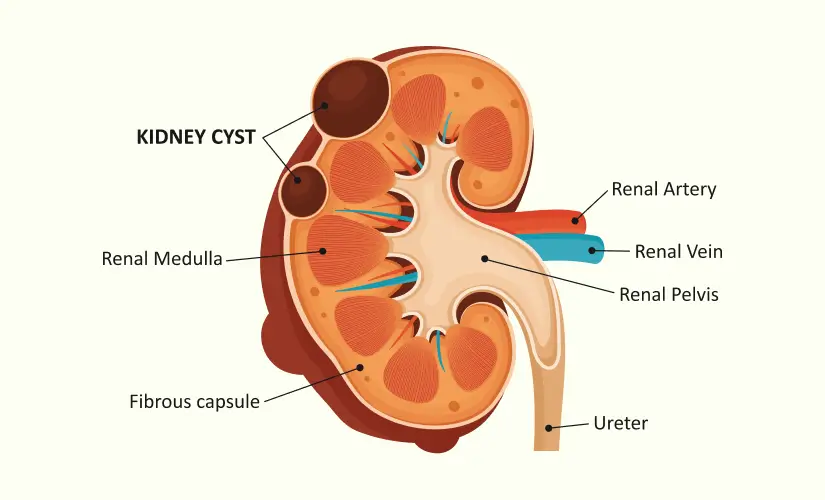What Are Kidney Renal Cysts?
Renal cysts are fluid-filled sacs that form in the kidneys. They’re usually benign (non-cancerous), and their size can vary significantly—from tiny to quite large. Kidney cysts become more common as people age, particularly after age 50, and usually cause no symptoms or health issues. These cysts can occur in one or both kidneys.
While most renal cysts are simple cysts, some may be associated with polycystic kidney disease or other inherited disorders, which require careful monitoring and treatment.
Diagnosis
Kidney renal cysts are often discovered incidentally during imaging tests conducted for other reasons.
Common diagnostic methods include:
-
Ultrasound: First-line imaging to identify and classify renal cysts.

-
Computed Tomography (CT) scan: Provides detailed images to distinguish between simple and complex cysts.
-
Magnetic Resonance Imaging (MRI): Used in complex cases or when more clarity is required.
-
Blood and urine tests: To evaluate kidney function and rule out infections or other issues related to cysts.
Kidney cysts are classified as either:
-
Simple cysts: Clearly defined borders, thin walls, filled with fluid, and typically benign.
-
Complex cysts: Irregular borders, thicker walls, may contain solid components, and may require further investigation due to a potential cancer risk.
Symptoms
Most renal cysts cause no symptoms, especially when small and simple. However, larger cysts or those complicated by infection or bleeding might cause:
-
Pain in the back or side (flank pain)
-
A feeling of heaviness in the abdomen
-
Blood in the urine (hematuria)
-
Urinary tract infections (UTIs)
-
Fever (if infected)
-
Elevated blood pressure or impaired kidney function (in rare cases)
Treatments
Treatment typically depends on the cyst’s size, symptoms, complexity, and whether it’s causing complications.
For simple cysts:
-
Usually no treatment is necessary.
-
Regular monitoring via ultrasound is often sufficient.
For symptomatic or larger cysts:
-
Drainage and sclerosis: Needle aspiration followed by injection of a sclerosing agent to shrink or eliminate the cyst.
-
Surgical removal (laparoscopic cyst decortication): Minimally invasive surgery to remove large, symptomatic, or complicated cysts.
For complex cysts:
-
Require careful evaluation due to potential cancer risk.
-
Surgery might be recommended for removal and biopsy.
